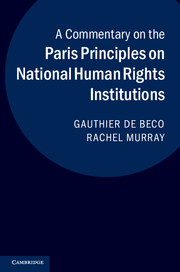Book contents
- Frontmatter
- Contents
- Foreword
- List of abbreviations
- Part I Background: history and challenges
- Part II Commentary principle by principle
- 3 Competence
- 4 Mandate
- 5 Pluralism and representativeness
- 6 Independence
- 7 Working methods and strategy
- 8 Quasi-judicial powers
- 9 Stakeholders
- Part III Twenty years later: the future of the Paris Principles
- Annex I Principles relating to the status of national institutions (The Paris Principles)
- Annex II ICC General observations as at May 20131
- Bibliography
- Index
- References
7 - Working methods and strategy
from Part II - Commentary principle by principle
Published online by Cambridge University Press: 05 November 2014
- Frontmatter
- Contents
- Foreword
- List of abbreviations
- Part I Background: history and challenges
- Part II Commentary principle by principle
- 3 Competence
- 4 Mandate
- 5 Pluralism and representativeness
- 6 Independence
- 7 Working methods and strategy
- 8 Quasi-judicial powers
- 9 Stakeholders
- Part III Twenty years later: the future of the Paris Principles
- Annex I Principles relating to the status of national institutions (The Paris Principles)
- Annex II ICC General observations as at May 20131
- Bibliography
- Index
- References
Summary
METHODS OF OPERATION
Within the framework of its operation, the national institution shall:
(a) Freely consider any questions falling within its competence, whether they are submitted by the Government or taken up by it without referral to a higher authority, on the proposal of its members or of any petitioner,
(b) Hear any person and obtain any information and any documents necessary for assessing situations falling within its competence;
(c) Address public opinion directly or through any press organ, particularly in order to publicize its opinions and recommendations;
(d) Meet ona regular basis and whenever necessary in the presence of all its members after they have been duly concerned;
(e) Establish working groups from among its members as necessary, and set up local or regional sections to assist it in discharging its functions;
(f) Maintain consultation with the other bodies, whether jurisdictional or otherwise, responsible for the promotion and protection of human rights (in particular, ombudsmen, mediators and similar institutions);
(g) In view of the fundamental role played by the non-governmental organizations in expanding the work of the national institutions, develop relations with the non-governmental organizations devoted to promoting and protecting human rights, to economic and social development, to combating racism, to protecting particularly vulnerable groups (especially children, migrant workers, refugees, physically and mentally disabled persons) or to specialized areas.
The Paris Principles set out a range of methods by which NHRIs should operate. Although the Paris Principles provide some guidance, in practice, NHRIs differ significantly in terms of how they function. Additional issues also determine how effectively they operate. For example, it is clear from research that in order to have the greatest impact, NHRIs also need to prioritise and develop a coherent strategy to manage their work. As will be noted in Chapter 10, compliance with the Paris Principles does not necessarily guarantee effectiveness. There are a number of issues that are not mentioned in the Paris Principles which impinge on the ability of an NHRI to have an impact, and this chapter, as well as discussing and critiquing the Paris Principles, will also briefly examine omissions in this context.
- Type
- Chapter
- Information
- Publisher: Cambridge University PressPrint publication year: 2014



